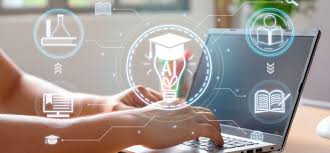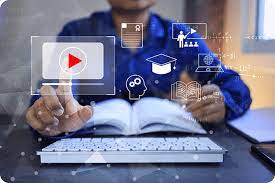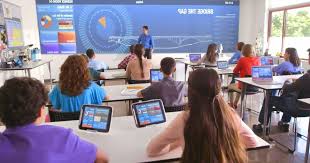Education is the cornerstone of societal growth, innovation, and empowerment. As we advance through the 21st century, the educational landscape has undergone dramatic shifts, adapting to new technologies, methodologies, and societal needs. In this article, we will explore the evolution of education, highlighting the key trends, challenges, and opportunities that are shaping the learning experience for students around the globe.
The Changing Landscape of Education
The 21st century has seen a transformation in how education is delivered and received. From traditional classroom settings to the rise of online learning platforms, education is no longer confined to the four walls of a school. Technology has played a significant role in reshaping the educational experience. The rapid growth of the internet, social media, and digital tools has opened up new opportunities for collaboration, access to resources, and the ability to learn from anywhere at any time.
Key Factors Influencing the Evolution of Education
- Technology Integration in Learning One of the most significant shifts in education is the integration of technology. Tools such as tablets, interactive whiteboards, and online resources have made learning more engaging and accessible. Virtual classrooms, AI-driven education apps, and eLearning platforms are enabling personalized learning experiences, breaking down the barriers of traditional teaching methods.
- The Rise of Online and Remote Learning The COVID-19 pandemic accelerated the adoption of online learning. Today, millions of students participate in online courses, webinars, and virtual classrooms, allowing education to continue without physical boundaries. Remote learning has proven to be a valuable tool in making education more flexible, diverse, and accessible.
- Student-Centered Learning In the past, education systems were primarily teacher-driven. However, the focus is now shifting toward student-centered learning. This approach emphasizes active participation, critical thinking, and problem-solving. Educators are adopting more collaborative learning techniques that cater to individual student needs, fostering creativity and independent thought.
- Globalization of Education The modern world is increasingly interconnected, and education systems are adapting to this globalized landscape. Students today are exposed to a broader range of ideas, cultures, and perspectives. Online platforms and cross-border collaborations are breaking down geographical barriers and creating global classrooms, where ideas can be exchanged freely across nations.
- The Role of Lifelong Learning The rapid pace of technological advancements means that education cannot be confined to childhood or adolescence. The concept of lifelong learning has become integral to the modern educational landscape. Professionals are constantly required to upskill and reskill in response to new technological developments, ensuring their relevance in the workforce.
Challenges in Adapting to the 21st Century Educational Needs
While the evolution of education brings many benefits, it also presents challenges that must be addressed:
- Digital Divide Despite the growth of digital learning, there remains a significant digital divide between affluent and underserved communities. Access to technology and high-speed internet is still limited in many parts of the world, creating inequalities in educational opportunities.
- Quality of Education As more learning takes place online, the quality of education can vary greatly. Not all online courses or digital resources meet the standards necessary to provide a comprehensive education. Ensuring that digital platforms maintain high-quality content is crucial for effective learning.
- Teacher Training Teachers must adapt to the ever-changing educational environment. This requires continuous professional development and training in new technologies and teaching methods. While many educators are embracing these changes, some may struggle with the transition, affecting the overall quality of instruction.
- Adapting to Diverse Learning Styles The shift to a more individualized, student-centered approach brings challenges in catering to diverse learning styles. Some students thrive in digital learning environments, while others may require more face-to-face interaction. Finding the right balance between traditional and modern teaching methods is crucial.
The Future of Education: Opportunities and Trends
Looking ahead, several key trends will continue to shape the future of education:
- Artificial Intelligence and Machine Learning AI and machine learning will revolutionize how students learn and how educators teach. AI-powered tools can offer personalized learning experiences, analyze student performance, and even predict future educational outcomes.
- Gamification in Education Gamification is becoming an increasingly popular trend in modern education. By incorporating game-like elements into learning, students can engage more deeply with the material, improving motivation and retention.
- Virtual Reality and Augmented Reality Virtual and augmented reality technologies are bringing immersive learning experiences to students. These technologies allow learners to explore complex concepts in a highly interactive, visual format, from walking through historical events to conducting virtual science experiments.
- Collaborative and Project-Based Learning Collaborative learning models and project-based learning will continue to gain traction in the 21st century. These methods encourage teamwork, problem-solving, and real-world applications of knowledge, preparing students for the challenges of the modern workforce.
- Focus on Social-Emotional Learning (SEL) As the world becomes more interconnected, emotional intelligence is gaining recognition as a critical skill. Social-emotional learning (SEL) programs are helping students build resilience, empathy, and communication skills—traits that are essential in both academic and personal life.
Conclusion
The evolution of education in the 21st century is an exciting and transformative process. As technology, globalization, and personalized learning continue to shape the landscape, we must ensure that all students have access to the resources they need to succeed. By addressing challenges such as the digital divide and ensuring quality education for all, we can build an education system that meets the needs of today’s diverse and rapidly changing world.
Call to Action
As educators, students, and parents, it is crucial to embrace the changes and opportunities presented by this evolution. Explore digital learning tools, advocate for access to technology in underserved communities, and continue to support the growth of innovative educational models. Together, we can shape the future of education and empower the next generation of learners to thrive in an ever-evolving world.
SEO Keywords: education evolution, 21st-century education, technology in education, online learning, student-centered learning, digital divide, global education trends, lifelong learning, AI in education, future of learning, educational innovation, personalized learning, virtual reality in education, gamification in education, social-emotional learning, collaborative learning, future education trends, global classrooms, educational access, modern education challenges, teacher training in technology, innovative education models, education transformation, quality education, technology-driven education, digital learning tools, project-based learning, personalized education.





